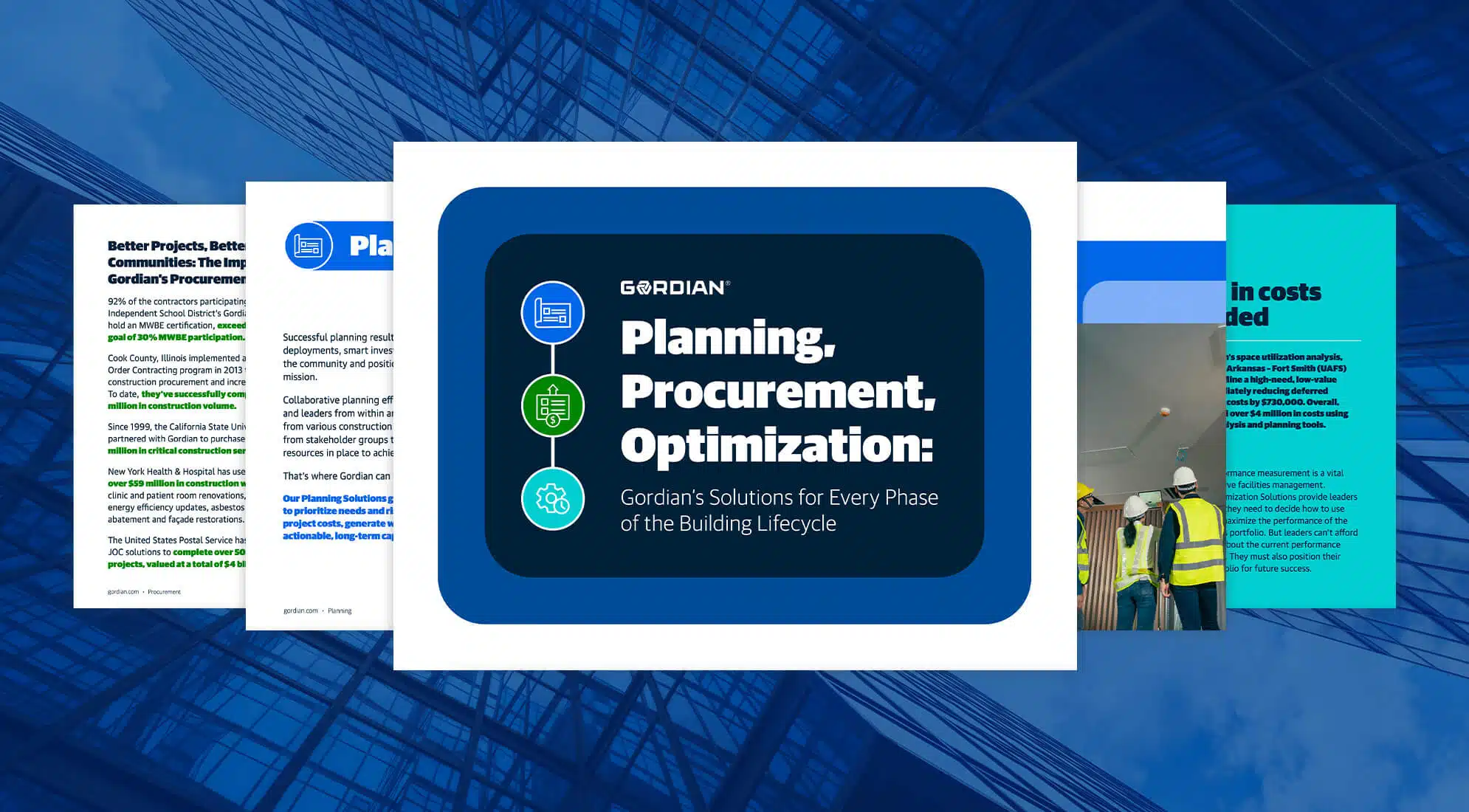
15 Frequently Asked Questions about Gordian Job Order Contracting Programs
Gordian Job Order Contracting programs are trusted by procurement professionals and facilities teams to purchase construction services efficiently and complete high-quality renovations, maintenance projects and repairs faster. With 30+ years of establishing and overseeing Job Order Contracting programs and over 300 active programs across the country, we know what matters to the hardworking people who maintain facilities across North America. Here are questions we hear often about Job Order Contracting in general and Gordian Job Order Contracting programs.
1. What is Job Order Contracting?
Job Order Contracting is a unique, indefinite delivery, indefinite quantity (IDIQ) procurement process that helps facility and infrastructure owners complete many repair, maintenance, renovation and straightforward new construction projects through a competitively awarded contract. Unlike traditional bidding where each project is identified, designed and then put out to bid, Job Order Contracting establishes competitively-bid prices up front and eliminates the need to separately bid each project. Under the Job Order Contract, awarded contractors build all project Price Proposals using preset pricing established in a Unit Price Book (UBP).
Job Order Contracting is an easy and expedited construction sourcing option to keep in your procurement toolbox. Job Order Contracting is sometimes referred to as JOC, SABER, TOC, WOC and DOC.
2. How long has Job Order Contracting been around?
Job Order Contracting was created in 1982 by Gordian’s founder, Harry H. Mellon, to tackle the demanding requirements, tight timeframes and stringent competitive bidding requirements at U.S. Army facilities in Europe. The purpose of Job Order Contracting is to simplify the process of completing repair, maintenance, renovation and straightforward new construction projects. Today, thousands of Gordian Job Order Contracts are active and help organizations of all sizes complete more than $3.2 billion in construction volume annually.
3. Why would I use Job Order Contracting?
The process to procure repair, maintenance, renovation and straightforward new construction projects often takes longer than the actual construction timeline. Job Order Contracting simplifies and expedites the construction procurement process, so work can begin faster. With JOC, local contractors bid on an IDIQ contract, not individual jobs. The solicitation process is done upfront, and pricing is established with a UPB. Awarded JOC contractors are ready to begin work at a preset price as soon as the project is identified. JOC simplifies and expedites the construction procurement process, so work can begin faster.
Market Research: Job Order Contracting as an Alternative Project Delivery Method – Watch this On Demand Webinar to hear the findings of the recent Gordian and NIGP market research report directly from the research team.
4. How does a Gordian Job Order Contracting program save time?
Traditional procurement cycles typically take months to complete and require a significant amount of administrative and technical resources. Job Order Contracting reduces this time significantly. In fact, a study by Arizona State University found that JOC project owners report a 65% reduction in overall service delivery compared with traditional project delivery methods.
Once a Job Order Contract is awarded, the owner can ask the contractor to perform a series of projects. There is no need to prepare, copy, advertise and distribute bid packages for each project. This time-consuming front-end process is completed one time, rather than repeated for each project, and the procurement process takes weeks instead of months. Arizona State’s study revealed that 94% of Job Order Contracting projects are delivered on time, compared to only 63% for Design-Bid-Build and 73% for Design-Build.*
Gordian has more experience implementing JOC programs and helping owners and contractors execute projects than anyone else in the industry. We have spent 30+ years refining a repeatable, proven JOC process, and Gordian’s contracting specialists have the expertise to keep your projects moving.
5. How does a Gordian Job Order Contracting program save money?
Budgetary control is the cornerstone of Gordian’s Job Order Contracting solutions. Arizona State University’s study found that 91% of Job Order Contracting projects were delivered on budget. Additionally, owners estimated a 24% savings in administrative costs, while contractors estimated a 21% overall cost savings.* The cost of procuring construction projects with JOC is lower than traditional procurement methods because the owner does not have to repeat the entire procurement cycle for each project. Local bidding requirements are satisfied with a single solicitation.
All construction costs are firm and published in Gordian’s Construction Task Catalog® (CTC), a Unit Price Book of more than 275,000 construction Tasks. Each Task includes a detailed description, unit of measurement, unit price and, where applicable, demolition cost. The Unit Prices contain locally developed direct costs for material and labor. There are a set of technical specifications for each of the construction Tasks and general conditions that contain the specific language concerning the execution of the contract. These Tasks are built precisely for owners, so they pay a fair price for their particular market and their particular needs. The awarded contractor has competitively bid a coefficient or adjustment factor, effectively a market adjustment, to the pre-established Unit Prices in the CTC, so the owner is assured a competitive price for each element of a project’s Scope of Work.
Bidding on individual projects is time consuming and costly for contractors, and since they may only be awarded a small percentage of jobs, they’re more likely to increase overhead costs and profit margins on each individual bid. With JOC, contractors also benefit from the single solicitation process and pass those overhead and profit savings to the owner.
Additionally, once the Price Proposal is submitted by the awarded contractor, Gordian will conduct a line-by-line review to confirm every relevant Task necessary to complete your project is included. This ensures you’re getting the project you want, at the right price, with an auditable electronic paper trail. From initial contractor proposal to job order, Gordian’s proposal review process is proven to save owners an average of 5.9% in hard/construction costs.
Agencies have also turned to their Gordian JOC solutions after traditional bids came in over budget. Here are two examples of significant project cost savings from the Arizona Department of Administration (ADOA) and the City of St. Paul, MN.
6. How are change orders handled through a Gordian Job Order Contracting program?
The Job Order Contracting process naturally reduces change orders because all project stakeholders (owner, contractor and Gordian representative) participate in a site visit called a Joint Scope Meeting. During this meeting, the team walks the job site to develop a Detailed Scope of Work (which the contractor will use to develop a Price Proposal) in a collaborative and constructive atmosphere. This step reduces the misunderstandings and mistakes that lead to most change orders, but that doesn’t mean changes never happen.
When a project scope changes, the process starts anew, and the project team meets at the site for a Joint Scope Meeting just as they did at the beginning of the project. Together, they develop a Detailed Scope of Work and process the expanded scope as a separate Job Order. Changes are priced out of the Construction Task Catalog, eliminating price negotiations and unnecessary delays. A collaborative software platform keeps everyone on the same page, and Gordian’s proven process keeps the project moving.
7. How does a Gordian JOC program ensure a higher quality of work?
While a single contract is in place for multiple projects, the contractor must still satisfy the owner’s standards of quality, timely construction to ensure future work. The owner is not obligated to give the contractor more projects but may if they are satisfied with the working relationship. The potential of a steady stream of work motivates the contractor to meet and exceed expectations with quality, on-time construction.
The Arizona State University study found 96% of Job Order Contracting projects were rated satisfactory by respondents, while almost all (99%) owner participants said they would recommend Job Order Contracting to other owners. Compared with Design-Bid-Build and Design-Build, project owners say they are 60% more satisfied the Job Order Contracting process.
Gordian JOC projects follow a proven process to make sure every scope is accurate and complete. It starts with a meeting where you, your contractor and a Gordian professional walk the job site together to collaborate and agree on the project. By the end of the meeting, the scope of work will be clear to all, creating a foundation for the project’s success.
8. Can a Gordian Job Order Contracting program help meet my organization’s diversity/participation requirements?
Gordian has proven success helping clients meet, track and exceed their inclusion goals for disadvantaged, local, small, minority-owned, veteran-owned and woman-owned business enterprises. In fact, 35% of contractors involved in a Gordian JOC program hold a minority business certification. Diversity/Inclusion/ Participation initiatives can be handled on a project-by-project or program-wide basis.
Gordian performs outreach to your contractor community to help educate and encourage participation in your JOC program. Once the general contractors are awarded, Gordian will conduct additional outreach to sub-contractors to help ensure your program meets your inclusion goals. The owner has the right to approve all subcontractors prior to issuance of the purchase order. Any specific conditions of the project, such as bonding or special insurance, is specified to the purchase order and provided to the owner. Most of these considerations will be handled up front in the initial customized bid documentation. Gordian’s software application also tracks your KPIs, so you know how your program is performing at all times.
9. How do contractors benefit from participating in a Gordian Job Order Contracting program?
With a Gordian JOC program, contractors have the potential for a reliable stream of work for a given period because they bid on an IDIQ contract, not individual jobs. The single-bid process enables projects to start faster, which means less administrative overhead and more construction work for the contractor. The prospect of a consistent revenue stream motivates awarded contractors to take on projects of all sizes and scopes. Gordian’s JOC solutions enhance owner/contractor collaboration by following a transparent, flexible and repeatable process. Preset pricing keeps negotiations to a minimum. Best of all, the performance-based contract fosters a trusting partnership that results in high quality work, a win-win for everyone.
10. How can I access a Gordian Job Order Contracting program?
Gordian’s JOC solutions are flexible and can be configured to provide a variety of service levels. You can implement your own JOC program, or you can access competitively-awarded Job Order Contracts through cooperative purchasing networks via our ezIQC® solution. No matter which option you choose, all Gordian JOC contracts are publicly advertised for competitive bidding and awarded in accordance with the local procurement laws.
11. How much does a Gordian JOC program cost?
There are no upfront costs to setting up a Gordian JOC program. Gordian will design your JOC program, help prepare your bid documents, assist with contractor outreach, configure the JOC software and customize your CTC. Once the contract is awarded, Gordian Account Manager(s) will also help prepare your Detailed Scopes of Work and review Price Proposals to make sure the contractor has included the right tasks and quantities to deliver accurate project pricing. Gordian will also train your staff and the awarded contractors to follow JOC best practices, in addition to providing ongoing technical and administrative support.
When, and only when, you execute a project under your Gordian JOC program, Gordian will receive a percentage of the total cost of that project. Gordian is not paid until a Job Order is issued. Total Gordian JOC program costs is dependent on construction volume.
12. Is JOC considered a legal procurement method in Canada?
Job Order Contracting has been in use in Canada since 2009. JOC satisfies the competitive-bidding process – it simply does so by competitively awarding construction services as an indefinite delivery/indefinite quantity (IDIQ) contract. Federal and provincial law in Canada are either supportive of or silent regarding alternative procurement methods in Canada and the legality of group purchasing organizations in Canada. From our research, we believe JOC is legal in Canada. Different localities may have nuanced positions on JOC that Gordian can work with and adapt to.
13. How does JOC deal with exceptional and specific inflation?
In general, the advantages to the owner and builder from variations in labor, material and equipment market prices and the Construction Task Catalog even out over the course of the term. However, there are specific provisions within the program for portfolio owners and JOC contractors to deal with price exceptions.
14. Is JOC a departure from Canada’s jointly developed Construction Contract Documentation Committee (CCDC) contract forms?
JOC can be implemented within the CCDC framework, as well as other contract document types. CCDC is a basis for contractual terms and conditions, whereas JOC applies to contractor selection and pricing.
15. Is there bonding in Job Order Contracting?
Every owner can set the rules of bonding according to individual contracting practices. Requirements will be stated in the Request For Tenders for contractors as they bid for JOC.
Contact us to discover how Job Order Contracting can benefit your organization.
*Job Order Contracting Performance, 2015 Industry Study, Performance Based Studies Research Group (PBSRG) Del E. Webb School of Construction at Arizona State University





